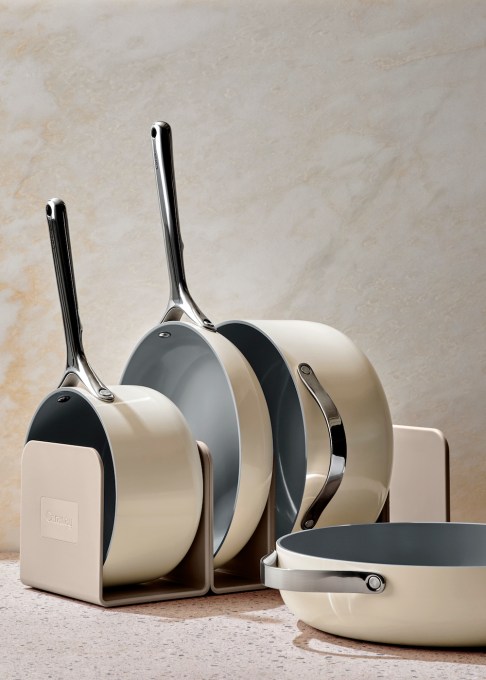Caraway, a direct-to-consumer startup selling ceramic pots and pans, is announcing that it has raised $5.3 million in seed funding.
Founder and CEO Jordan Nathan (previously a brand manager at e-commerce holding company Mohawk Group) told me that he became interested in cookware after burning a Teflon pan and learned more about the dangers of Teflon poisoning.
In fact, although nonstick materials like Teflon are used most of the cookware sold in the United States, it turns out that that there are real health risks when those pots and pans are overheated.
So Nathan said Caraway offers non-toxic, eco-friendly pots and pans that are also well-designed and premium quality. The four-item cookware set costs $395 and also comes with pot and lid holders (Nathan noted that many consumers also struggle with storage).
When I brought up some of the broader issues facing direct-to-consumer startups before the pandemic, particularly around costly user acquisition, Nathan said, “Caraway has been focused on sustainable growth since day one. We’re only a few months old and growing very fast, but at the same time, we’re focused on cutting cost and making sure every dollar returns a profitable first purchase from consumers.”

Image Credits: Caraway
Caraway isn’t revealing any sales numbers, but Nathan suggested that the company has definitely benefited from increased consumer interest as everyone is stuck at home and doing more cooking.
And he said that interest extends beyond buying Caraway products: “It’s been a really good time to activate our community. There’s been a lot more engagement, a lot of sharing of user generated content, sharing on Instagram — not just for cookware and pans, but education around cooking, around storage, around design.”
The company’s supply chain has also been affected by the pandemic. Nathan said his team has done work to expedite shipments, but “where we’ve put our focus has really just been communicating with customers that there will be delays.”
The new funding comes from more than 100 investors, including Republic Labs, Springdale Ventures, Wesray Social, Bridge Investments, WTI, CompanyFirst, G9 Ventures, Super Angel Syndicate (led by Ben Zises), Five Four Ventures, alongside Bonobos co-founder Andy Dunn, PopSugar co-founder Brian Sugar (PopSugar), Glossier and Arfa founders/executives Henry Davis and Bryan Mahoney, One Kings Lane co-founder Ali Pincus and Nik Sharma of Sharma Brands.
In a statement, Dunn said:
Many people think direct-to-consumer brands are going to struggle in this new economy. From being an investor in two dozen brands, the truth is more nuanced: some are really flourishing. Caraway had strong momentum at launch, with a clear vision from founder Jordan Nathan around the future of home goods. The COVID-19 pandemic then amplified that momentum with the surge of in-home cooking. Caraway’s out of the gates growth rate is in the top 1% of what I’ve seen in DTC brands. This is not a pots and pans company, this is a disruptor to traditional brick and mortar multi-category home brands.
To that last point, Nathan said Caraway has already expanded into kitchen linens, and there are plans for other home products.
“With every new product we launch, we’re bringing the same focus [that we brought to] cookware,” he said. “The same colors, the same sleek and timeless design, the non-toxic, eco-friendly material. And every product we launch will have a storage solution built into it.”
from Startups – TechCrunch https://ift.tt/2ZMqyev
Comments
Post a Comment